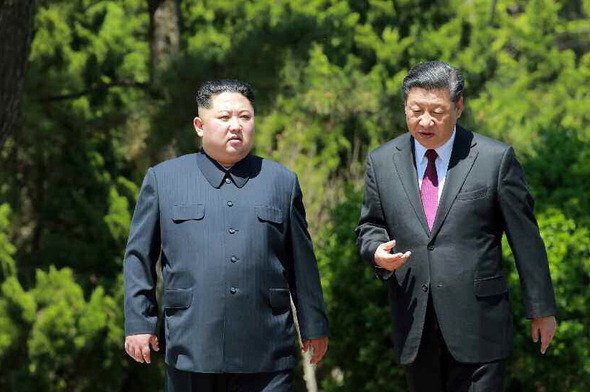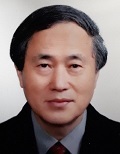 |
|
North Korean leader Kim Jong-un (left) talks with Chinese President Xi Jinping on a beach in Bangchuidao Island off the coast of Dalian, Liaoning Province.
|
Economic development should be viewed as Kim’s policy approach
The prospects for the planned North Korea-US summit now appear uncertain, but many observers are still watching to see whether they can yet provide a turning point toward North Korea’s denuclearization. The success of the summit will hinge largely on the direction and perspective adopted in assessing North Korean leader Kim Jong-un’s changing stance on denuclearization. If his shifting attitude is seen as a reaction to sanctions and pressure from the UN and international community, the prospects for a positive outcome from the summit grow slimmer. But if it is seen as reflecting a change in Pyongyang’s policy approach – the end of its “two-track approach” of nuclear and economic development and a new focus on building the economy – the chances for a more optimistic outcome increase. Since Kim took power, Pyongyang has carried out a full-scale restoration of its party-led system, allowing the regime’s policies to become finalized and legislated through party decisions. In that sense, the party’s decision on Apr. 20, when it established economic development as its priority, should be understood and assessed as the basic policy approach of the Kim Jong-un regime. Beijing’s assessment of Pyongyang’s change in course has been wholeheartedly positive. Having major interests in North Korean denuclearization, reforms, and openness, the Chinese government has used that assessment as a basis for embarking on a full-scale effort to repair its relations with the North after years of strain. It has worked to restore normal interchange and actively sought out a role and opportunity for collaboration in the coming processes of reform, openness, and economic development in North Korea. This is readily apparent in the North’s all-out effort to learn from the results of Chinese reforms and openness, stressing mutual party-level exchanges related to national construction experiences since their two summits. It’s especially significant that Chinese Communist Party Politburo Standing Committee member Wang Huning has played a central role in this new and comprehensive adjustment of China’s policies on North Korea. With the one-party system facing serious challenges amid rapid economic and social development, Wang has played a key role in laying the theoretical groundwork for establishing that system’s legitimacy and legality by transforming the character and constitution of the party to adapt to trends of Chinese social change. His rise in terms of China’s North Korea policy can be read as signaling Beijing’s commitment to applying its past experiences in terms of achieving rapid economic and social development while maintaining a one-party system to future North Korean reform and openness policies. The US, for its part, will need to approach Kim Jong-un’s changing stance on denuclearization as a product of the change in policy approaches announced through the party’s decision rather than as the result of its own sanctions and pressure tactics. Human rights discussions should come later For a future North Korea-US summit to produce a successful outcome in terms of denuclearization, it will need to focus its agenda on both denuclearization and the issue of regime security guarantees. Other issues between the two sides, including those concerning human rights, will need to be left out as much as possible for the time being. North Korea views denuclearization as a means to achieve the end of regime security, while the US holds the opposing position, seeing regime security as means to achieve denuclearization. These contrary positions, however, could actually work in favor of a successful summit. The two sides may reach a positive outcome if the US can show some efficacy and flexibility in terms of using the North’s basic goal – the regime security issue – as a means to achieve its own desired goal of denuclearization.
 |
|
Park Du-bok, honorary professor at the Korea National Diplomatic Academy
|







